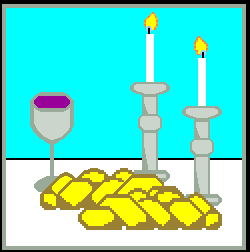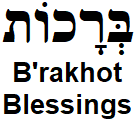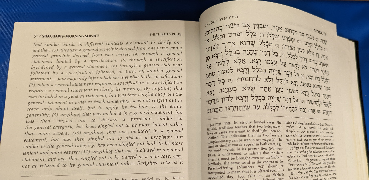Please note that this page contain the name of God.
If you print it out, please treat it with appropriate respect.If you do not have experience reading transliteration
please see the Guide to Transliteration.
The Havdalah ritual marks the end of Shabbat or a holiday. The word Havdalah means "separation," because this ritual marks the separation between a special day and he rest of the week. It should be performed after nightfall, which is the time when three stars can be seen in the sky, normally 45 minutes to an hour after sundown, depending on your latitude. For the precise time when Shabbat or a holiday ends in your area, consult the OU Calendar provided by the Orthodox Union (look for the word Havdalah near the end of the list).
The first of the four havdalah blessings is made over wine or another liquid. If wine or grape juice is not used, you should substitute shehakol nih'yeh bid'varo (by whose will all things come to be) for borei p'ri hagafen (who creates the fruit of the vine). This is the same blessing that is traditionally recited whenever we eat or drink any grape product. Note that you do not drink the wine immediately after completing the blessing, as you usually do. The wine is held until the end of the last blessing.
if using wine or grape juice
if using other liquids
Don't drink the wine yet!
The second blessing is recited over fragrant spices. The spices represent a compensation for the loss of the special Shabbat or holiday spirit. The spices commonly used are cloves, nutmeg, cinnamon or bay leaves. They are commonly kept in a special decorative holder called a b'samim box or in a decorative bag. Some people stick whole cloves into an etrog after the end of Sukkot and use that for b'samim.
The third blessing is recited over the special, multi-wicked Havdalah candle. If you cannot obtain a Havdalah candle, you can hold two candles close together, so their flames overlap. I have also used party candles (long, very thin candles) that I warmed up and twisted together.
Lighting a flame is a vivid way of marking the distinction between Shabbat or holiday and the weekday, because we cannot kindle a flame on Shabbat.
After the blessing is recited, hold your hands up to the flame with curved fingers, so you can see the shadow of your fingers on your palms. This is done because it would be improper to recite a blessing for something and then not use the thing.
The final blessing is the havdalah blessing itself, the blessing over the separation of different things. The blessing is recited over the wine.
After the blessing is complete, drink most of the wine. The flame from the candle is extinguished in what is left of the wine, either in the original glass or on a tray where you pour the remaining wine.
 Shabbat
Shabbat Shabbat Evening Home Ritual
Shabbat Evening Home Ritual Common Prayers and Blessings
Common Prayers and Blessings Prayers and Blessings
Prayers and Blessings Jewish Liturgy
Jewish Liturgy